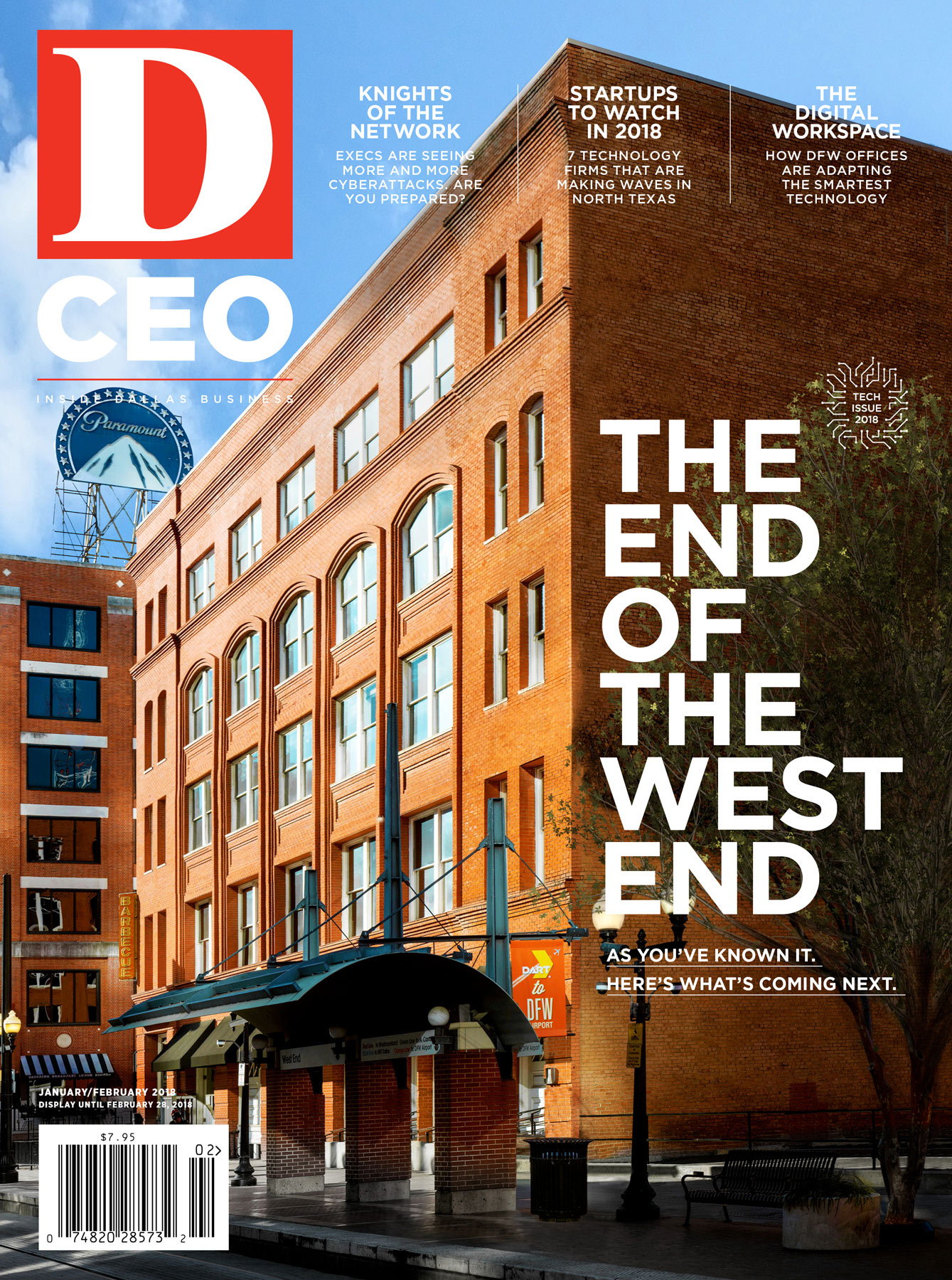For the first time in its history, Dallas has attracted some of the world’s largest office investors. J.P. Morgan, Mirae Asset Global Investments, and many others have planted flags in Dallas-area buildings over the last few years.
Before foreign and institutional capital would commit, office properties had to become more attractive in a way that had nothing to do with curb appeal. And landlords, in turn, benefited from the shift.
“Dallas has always been a gross lease market, until about five years ago,” CBRE Executive Vice President Phil Puckett says.
The shift away from a gross lease market and to a triple net market signals a few positive things for the real estate industry: Dallas’ has become a landlord-favorable market, big time investors see Dallas as an investment rival to cities like New York or Chicago, and Dallas has grown up.
“Dallas was never a sophisticated market to the degree that other cities were,” Puckett says. “Now that Dallas has such high employment and in-migration, these investors are pouring in here. It’s growing up—and growing up quickly.”
A New Lease on Dallas
There are two primary reasons office leases have shifted to a triple net model, says John Alvarado, senior vice president in CBRE’s capital markets division.
For one, triple net leases are much simpler for building owners. Under a triple net lease, tenants pay a fixed rent and a proportional share of many variable building costs—such as real estate taxes, insurance, and maintenance—on a per-square-foot basis. Under a gross lease, tenants pay a fixed rent per square foot, plus electric costs. Tenants pay the same price for their offices every month (disregarding preordained rent increases) for the term of their lease.
Secondly, triple net leases shift the risks of rapidly increasing expenses to the tenant, rather than the landlord. In a gross lease, the predecessor of a triple net lease, a tenant’s first year of occupancy, called a base year, does not initially include a proportional share of variable costs. Under this structure, tenants and landlords would settle up at the end of a base year, causing the landlord to shoulder those costs for a tenant’s first 12 months. A landlord would have one base year associated with each tenant, which can get convoluted quickly in a multitenant building.
“That process is very complex and cumbersome,” Alvarado says. Triple net leases allow for more simplicity in accounting and billing. “Even though on full-service gross leases, landlords are allowed to recover increases over a base year … landlords absorb the entirety of operating expenses for one year’s time,” he says.
Building owners can pass through virtually all operating expenses to their tenants under a triple net lease. There will be protective language in a lease detailing reimbursable and non-reimbursable expenses, also called inclusions and exclusions, Transwestern Principal Robert Deptula says. “Triple net leases are all about risk mitigation for the landlord,” he adds.
Real estate taxes, which are the fastest-growing component of a landlord’s overall property expenses, have skyrocketed in recent years. Under a base year model, landlords must wait 12 months to recover a tenant’s share of taxes.
Landlords mitigate the risk of escalating operating expenses—particularly property taxes—by passing them through to tenants with a triple net lease.
But if a landlord starts converting its tenants’ leases to triple net when each lease comes up for renewal, tenants shouldn’t panic, Deptula says. By definition, triple net leases aren’t necessarily more expensive than gross leases. But because triple net office space in DFW has primarily been a function of newer and better quality buildings, those buildings are more expensive than older, less amenitized buildings.
For Puckett, who represents tenants, base year leases versus triple net leases make no difference, because he and his team will account for all the math anyway. “We make sure that all these components—taxes, maintenance, electric, everything—go into our analysis,” he says. “It’s our job to make sure these numbers are not underinflated.”
Through this analysis, parties come to an understanding on expenses that are included and excluded from a lease. For example, a landlord would typically pass along roof repair costs to a tenant through a repairs and maintenance line item, but would shoulder the cost of a new roof as a capital expenditure.
Puckett says it’s not only important to come to an agreement on those inclusions and exclusions during lease negotiations, but to audit those expenses every year after. “Some landlords won’t even give you a line item break down of inclusions,” he says. “Ask for one.”
But that’s not to say all landlords pass through every nickel and dime to their tenants. Many prudent landlords protest high property taxes, because “they know their tenants will have to pay those taxes, and tenants don’t like surprises,” Puckett says.
And savvy tenants can still negotiate caps on certain operating expenses.
Inclusions generally include building operating expenses like custodial services, security, upkeep, and maintenance. Exclusions could be a landlord’s legal expenses and capital expenditures.
A City Amongst Peers
There’s little dispute that Dallas has matured since the Great Recession, and this shift in leasing demonstrates as much.
Deptula first started seeing Dallas-area buildings go triple net in 2011. “But you must change the lease [structure] when it expires, so that’s why it’s taken a few years to catch on,” he says. “You don’t just wake up one day and change the business deal; it’s a process.”
As buildings have been bought by institutional owners and tenants leases have come up for renewals, gross leases have been phased out.
Even within the area, some areas have been faster to adopt than others. Uptown, which has seen many new developments and sales of existing buildings over the last five years, has the highest percentage of triple net buildings in Dallas. Alvarado estimates 60 percent of Uptown offices lease on a triple net basis. Preston Center, which has historically been a more landlord-favorable submarket, is nearing half triple net, and Plano’s Legacy submarket is between a quarter and a third triple net, Alvarado estimates.
Over the last few years, many new and desirable office buildings have started leasing space on a triple net basis. Regardless of submarket, virtually all Class A buildings and multitenant offices completed after 2000 also lease this way.
And it’s no coincidence that submarkets with the most institutional and foreign investments are also the submarkets with the highest triple net-leased properties. “The real estate world changes at glacial speeds,” Deptula says. “And the real estate market in Dallas doesn’t like change. But as more development took place, particularly for trophy assets, financing and underwriting required those buildings to [lease] triple net because that’s what lenders are most comfortable with.”
Change-averse brokers took longer to embrace the new pricing, according to Deptula. “When brokers figured out triple net wasn’t the boogeyman—when they realized it was just a reality in the market—they were forced to understand it,” Deptula says.
Office leases evolving to a triple net model indicates a landlord-favorable market. Even other Texas markets, such as Austin and Houston, started leasing office space on a triple net basis years before Dallas.
“For many, many years, because of oversupply problems, [Dallas] has been a tenant’s market,” Alvarado says. “Landlords in Dallas, from a competitive standpoint, were concerned about making the switch to triple net because they thought … they’d be at a competitive disadvantage if they switched.”
When Dallas’ supply and demand balanced out in recent years, longstanding offices such as The Crescent first made the switch away from gross leases.
As Dallas continues to attract incoming businesses that will lease office space and investors looking for safe places to park their money, triple net leases will only become more common. “Now that we’re triple net, we’re not going back,” Deptula says.







